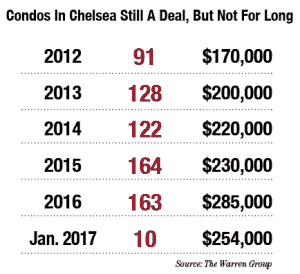
The FBI’s Boston regional headquarters recently occupied a new office building developed by a Chelsea-based ACS Development at 201 Maple St.
The city of Chelsea used to be synonymous with troubled municipal finances and a tradition of corruption that landed a succession of mayors behind bars.
Today the headlines are all about the wave of commercial and multifamily development in this densely-populated city of 38,000.
Hundreds of trendy loft-style apartments have been built in former industrial buildings within the Box District. The 452-unit One North apartment complex is over 94 percent occupied with average asking rents of $2.73 per square foot, according to researchers CoStar Group. That bodes well for future developments such as Fairfield Residential’s 692-unit Chelsea Lofts project, expected to break ground later this year.
The recent relocation of the FBI’s regional headquarters from Boston’s Center Plaza, bringing over 600 agency employees to a new 268,000-square-foot office building, is expected to accelerate demand for new retail, dining spots and hotels.
“The reason we chose to be here was location,” said Patricia Simboli, a principal for the FBI headquarters developer, Chelsea-based ACS Development Corp. “We believed in its proximity to Boston and Logan Airport, and that’s exactly what we’re seeing now. There was a little bit of luck and a little bit of timing.”
The ongoing extension of the MBTA’s Silver Line from Logan International Airport to four new stations in Chelsea has attracted interest from developers looking for sites near the right of way, said John DePriest, Chelsea’s director of planning and development.
The General Services Administration picked ACS as the developer in 2010 and leased the building on behalf of the FBI, but groundbreaking was delayed until 2014 following an appeal by a rival developer. ACS’ property beat out locations in South Boston and South End, which Simboli attributed to a combination of price and the Chelsea site’s proximity to major highways.
ACS traces its roots to the early 1980s, when Patricia’s father Anthony began acquiring and developing an eventual portfolio of 14 commercial properties in Chelsea. A former CIA agent and founder of a convenience store chain, Anthony Simboli built a 60,000-square-foot speculative office building in 1984 for his first project in the city. Simboli built or rehabilitated 14 buildings in Chelsea over two decades. Since 9/11, demand for commercial space near Logan International Airport has increased, Patricia Simboli said, as state and federal agencies including the Department of Homeland Security occupied space alongside small law firms and insurance companies.
Multifamily Development Pipeline Accelerates
One North, a luxury apartment community that’s a 5-minute walk from Chelsea’s MBTA commuter rail station, opened its 222-unit second phase in mid-April and currently has an occupancy rate of 94 percent, according to data from CoStar Group.
Developed by Gate Residential, the complex markets its “affordable luxury” with high-end touches such as quartz countertops and plank flooring. The niche has proven popular as a lower-cost alternative to newly-developed luxury high-rises in Boston, and One North’s average asking prices of $2.73 per square foot are the highest among the 72 large residential complexes in Chelsea tracked by CoStar. For an apartment with the average size of 881 square feet, that translates into a monthly rent of about $2,400.
One North’s performance indicates favorable prospects for Chelsea Lofts, a massive redevelopment of two city blocks previously occupied by scrap yards and the former Chelsea Clock Co. factory. San Diego-based Fairfield Residential paid $45 million to acquire the 8-acre site off Everett Avenue from Everett-based Thibeault Development in March 2016. It’s expected to begin demolition of remaining industrial buildings as soon as this summer, said John DePriest, Chelsea’s director of planning and development. The project is currently under Massachusetts Environmental Policy Act review.
The site, roughly two blocks from one of four Chelsea stops on the Silver Line Extension, reflects rising interest among developers for urban in-fill sites near the transit right-of-way, DePriest said. Maryland-based Baywood Hotels has begun permitting for a 106-room hotel nearby at 200 Second St.
 Condominium prices are steadily on the rise as urban pioneers scout the next streetcar suburb with comparatively affordable real estate. For homebuyers looking for short transit commutes to Boston, Chelsea remains one of the final affordable options even as prices have appreciated steadily in recent years.
Condominium prices are steadily on the rise as urban pioneers scout the next streetcar suburb with comparatively affordable real estate. For homebuyers looking for short transit commutes to Boston, Chelsea remains one of the final affordable options even as prices have appreciated steadily in recent years.
Median condo prices have risen nearly 68 percent since 2012, to $285,000 in 2015, according to data from by The Warren Group, publisher of Banker & Tradesman.
Yoni Haiminis, an agent with Estate Residential Group of South Boston, said the brick-and-beam lofts in Chelsea have become popular with Boston commuters. The Spencer Lofts complex, a former Buster Brown shoe factory redeveloped in 2004, is fetching $400 per square foot for its loft-style units, setting a high-water mark for large complexes, Haiminis said. But Chelsea remains a value market that’s attracting buyers priced out of South Boston and East Boston, he said. The discount could diminish as the Silver Line Extension puts Chelsea on the radar of more house hunters, similar to Somerville’s transformation following the opening of Davis Square station in 1985.
“We’ve educated a lot of buyers about it and it’s something in particular that investors have taken note of and they’re trying to get in before it opens,” said Haiminis, who has bought two investment properties in Chelsea himself. “Once it opens, the secret’s out.”
MassDOT reports that “the Bus Rapid Transit stations (Eastern Avenue, Box District and Chelsea) except Bellingham Square are scheduled to be completed by the end of February 2018” as part of phase one of the Silver Line Expansion project.
Editor’s Note: This story has been updated since it was originally published to include MassDOT’s comments on the timeline for the Silver Line expansion in Chelsea.








